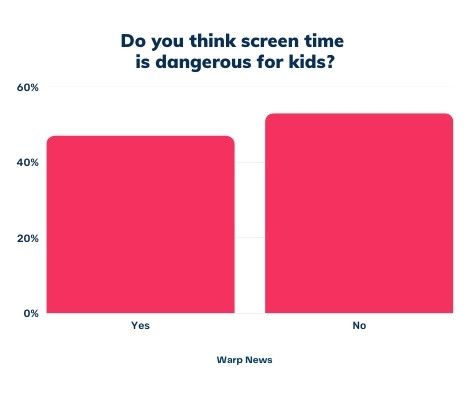
💡 Optimist's Edge: Dangerous with less screen time?
Computer games for children increase their IQ.
Share this story!
📉 What people think
A large number of books, articles, television features, and lectures are produced that warn against screen time. Digital screen use has been linked to obesity, depression, antisocial behavior, lack of sleep, and concentration difficulties.
In our survey, almost half, 47 percent, believe digital screen time is dangerous for children. However, a few more, 53 percent, believe this is not the case.

📈 Here are the facts
Now that there is more research to rely on, it is interesting to state that, contrary to what we have learned so far, digital material and screen time do not turn out to be directly harmful.
Rather, it may be a risk in itself to completely exclude computer games and interactive technology from a child's daily activities. Because who wants to deprive the younger generation of getting another boost in their development, if possible?
More and more studies point to more positive correlations between the use of digital technology and young people's development. A study from Karolinska Institutet earlier this year shows that children who play computer games at a young age have a higher intelligence quotient.
Torkel Klingberg, professor of cognitive neuroscience at the department of neuroscience, Karolinska Institutet, summarizes the connection between computer games and IQ development as follows:
"The results showed that the children who played more computer games than average also increased their intelligence between the two measurements by about 2.5 IQ points more compared to the average."
Klingberg explains that the purpose of the study was to investigate the impact screen time had on children's cognitive abilities. Instead, they discovered "a small but tangible effect on the intelligence of computer gaming", he tells SVT.
How is it possible that gaming affects intelligence is the question? The researchers believe that this is because the actual playing of computer games is more challenging than watching television itself.
"It is a form of problem-solving. We have seen before that certain cognitive abilities, such as working memory, can be trained if you are given challenges," explains Torkel Klingberg.
However, the study, which was conducted on American children is limited and does not differentiate between different types of computer games. But if the expert gets to choose which type of game should be better for brain development?
Cheryl K. Olson, a researcher working at Harvard Medical School, has studied thousands of children and lists in an article on the parenting site Parents the benefits of computer games:
- A strengthened problem-solving ability.
- Increased opportunities to make new friends.
- Leadership training and practice in following rules yourself
💡 Optimist's edge
Of course, children need variety and also physical activity. Turning off the screen can be done for children to become more physically active, which in itself is beneficial for development in general.
But doing it because "the screen damages them" is not a good reason. There is growing evidence that taking away some interactive activity like a computer game from a child may actually turn out to be a really bad idea.
In addition, there are games on the screen that increase children's physical activity.
👇 How to get the Optimist's Edge
❓ So, how do you get the most out of this knowledge?
- Find your way in the gaming and entertainment jungle. You want the children to learn new skills and develop abilities, not get bad habits and impressions that are not ripe for or cloud the view of the goal: to conquer new knowledge and abilities.
- Here's a list – (but feel free to create your own!) These are games that train your child in language and math, but also social codes and friendships, as well as facts. Several games are free, but premium versions can also be downloaded. Another list also has classic games like Minecraft and Lego. And - not to forget that chess can be learned online through the Swedish Chess Federation and other traditional games. On the Polish site PlayOK, you can play a variety of classic board games online - in around thirty languages.
- Benefit from the research results. Since much of the research in the field is still in its infancy, it may be worth looking into what results are now being discovered. Mapping the positive power of play and matching it with children's development and learning will be useful for educational purposes: schools, leisure centers, and preschools, parents will want to take part not only in the latest findings - but also in products that have a positive impact on children's development.
- Produce a "gaming CE marking." Who will be the first to IQ-mark computer games or at least produce examples of which games are the very best out of the possible dream combination of being able to contribute to increased cognitive ability, empathy, and ethical compass?
- Challenge the norm. Reading has long been the intellectual norm - could gaming be next? So many children and young people for generations were encouraged and inspired to read a lot and freely because it was considered useful. Could it be time for a similar liberalization when it comes to computer games? The more you read, the wiser you become - a completely uncontroversial mantra that could be replaced or at least supplemented with: if you want to be smarter - play more!
- Last but not least: Invest money or in get an education in the gaming industry. Especially when it comes to learning and development.
You now have an advantage because you have gained this knowledge before most others –